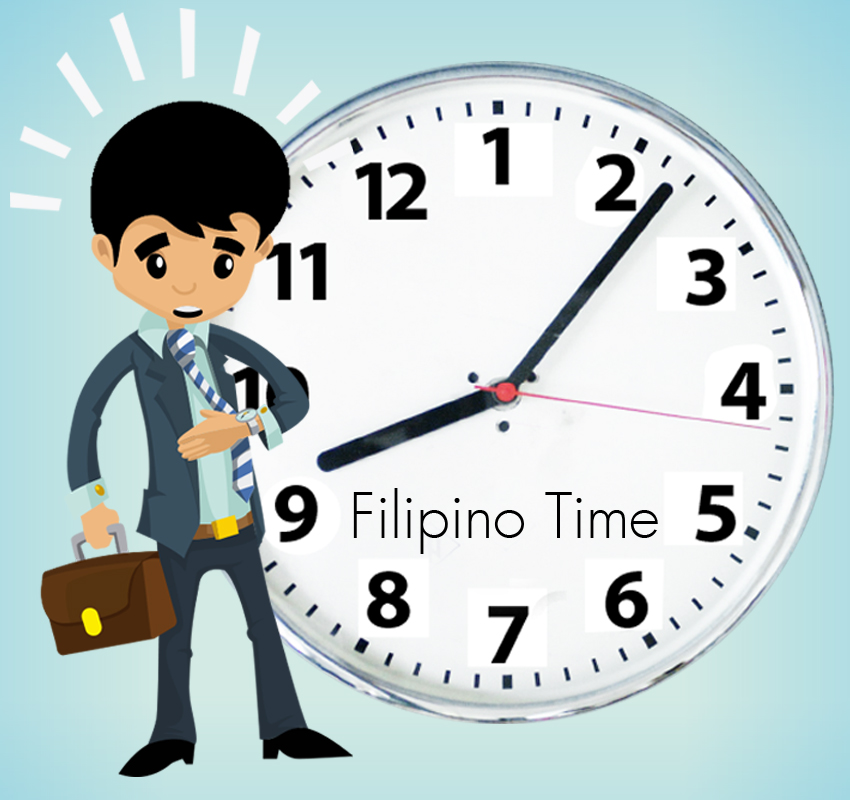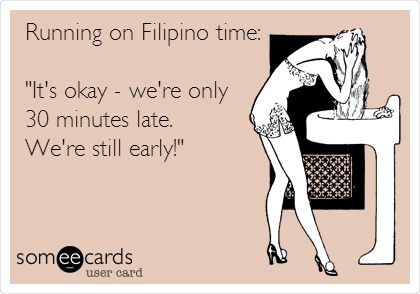By Sean Michael S. Caguiwa
There are only three certainties in Filipino life: death, taxes, and being late.
For someone who’s always had his calendar full, it was one of my utmost joys to attend occasions, training, or whatever event necessitated a call time. But as I ticked another event off my calendar, it was as if time also ticked along with it and went to waste.
I’m not leading you to the conclusion that my friends could never give me that dopamine rush or even fit a place in my core memory; it was just that they were always late, and I bore the consequences of waiting hours before the party was even complete.
As time eventually went by in its ever-continuous continuum, I also grew accustomed to being late—and I was a true “Pinoy”—for I’ve become someone who perpetuates the never-ending cycle of “Filipino time.” Why should I bear the burden of tidying myself up in a hurry when I could gather my time so I could slay my outfit? Well, the sad thing is that everyone thinks this way, and in the end, we’ve lived long enough to see ourselves become the villains we hated.
But in the same way that Filipinos are so fond of being late, why not apply it to our inner life philosophy?
I don’t have a personal vendetta for time, but if being late to the call time we’ve agreed upon is socially acceptable, why isn’t it okay for us to not be on the same path of success compared to our peers who have found their way to it already? It’s as simple as this: “Buhay ay ‘di karera” and I’m sure most have heard this from the viral videos that featured learners dancing and singing “Karera,” BINI’s song, during their ceremonies.
And with these videos booming, it’s just another sign that it is time to bolster the fact that it’s okay to be late in life because God has ordained our own paths that will be attained in their perfect timing—for His glory and our good.
But with this fact, it’s only been recently instilled in my mind to heed the truth that I will not always be first, the smartest in the room, or the one people will be pleased with. As a consistently overachieving student, it was as if people and I had been institutionalized with the pretense that it was a sure win for my end, and on the occasion that I lost, I fell into a never-ending spiral of self-doubt. It only led me to the fear of disappointment, and even if I did my best, I always felt like an impostor.
The sad thing is that this lived experience isn’t only my story to attest to, for the conservative roots of our culture have ingrained the idea that being the first to do something always equates to success. While being first may mean that you won a race, the problem is that this isn’t the race to dictate our lives; life is more than just one finish line.
Now, even if I had faced disappointment, I found beauty in the struggle, in the failure, and in the mockery I made of myself when I lost because I knew that there was always beauty in embracing our individuality. And inevitably, if we choose to accept that we have our own story to tell our grandkids one day, it allows us to grow at our own pace and would transform the abhorrent tragedies we once scorned to forget into valuable lessons. It isn’t fitting to succumb to the pressure that culture puts on us to conform to societal timelines, which can stifle our potential in the long run. And every time we choose to slack off because we know that it’s socially acceptable to be late to gatherings nowadays, it’s much healthier to embrace that it’s okay to be late in our dreams because we give ourselves the freedom to explore, to take risks, and to find our unique path without the fear of judgment or failure—without bothering other people’s time or breaching the agreed upon call time.
Just take a look at the success stories that household names in the industry experienced in life, which we once thought were full of success, only to find out that their fruits of labor were the reason their accolades made their way to them. For example, J.K. Rowling didn’t have a magical tale when she wrote “Harry Potter,” as she was rejected by multiple publishers before the book became a global phenomenon. And Colonel Sanders didn’t establish KFC until he was in his 60s. Our stories may never end up as glamorous as theirs, but may these tales be a reminder that lateness doesn’t preclude success; it often accompanies resilience, perseverance, and an appreciation of our achievements.
This is neither a personal love letter to tardiness nor am I romanticizing that Filipinos often struggle with punctuality. Rather, I realized that time wasn’t moving too quickly—I was simply trying too hard to run toward accolades not understanding that life isn’t a race or that I was running with two left feet. I was chasing goals that weren’t meant for me.
Ironically, being late taught me to cherish small moments, even if I missed some because I took my time. “Filipino time” showed me that true destiny isn’t found by rushing.
The world didn’t end when I placed third in the Regional School Press Conference, while all my peers moved on to the National School Press Conference. It didn’t stop when I didn’t attain “with highest honors.” And God didn’t forsake me despite the unfair treatment I received in 10th grade.
I can say, better late than never, it’s okay to be late—I prefer taking my time, and I hope you do, too.




